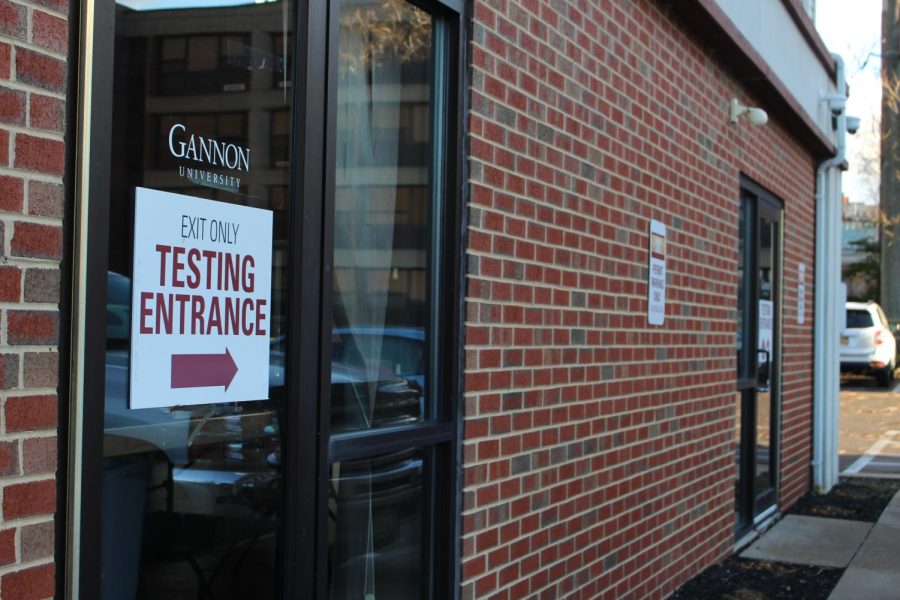Mixed opinions about delayed semester
Students and staff react to pushback of return to campus
The pushback of the beginning of the spring semester is just one piece of the COVID-19 mitigation plan at Gannon. Other pieces include testing, vaccination, quarantining, and the LiveSafe app.
January 25, 2022
Gannon University announced the delayed start of the spring semester on Jan. 4, as part of ongoing mitigation efforts at both the Erie and Ruskin campuses related to Covid-19.
Exposures to COVID-19 of both students and colleagues led to the decision for classes to begin on Jan. 18, eight days later than the original plan to start the semester on Jan. 10.
Formal move-in to residence halls and on-campus housing was shifted by a week as well.
Doug Oathout, chief of staff and director of marketing and communications at Gannon, said the decision arose in response to an abrupt rise in COVID-19 cases among students, faculty and staff during the final weeks of December and the first week of January, which aligned with the surge of cases locally and nationally. It was predicted that cases would continue to surge with the rapid spread of the Omicron variant.
“We thought it would be prudent to give the post-holiday surge in cases another week to work itself through our students and faculty while they were still off campus,” Oathout said. “We had been receiving an increasing number of people report in through LiveSafe that they were ill.”
Jack Sherwin, a freshman business marketing major, said that Gannon’s decision to delay the start of the semester was an overall fair decision to make.
“Most schools in Pennsylvania got delayed the start of the semester so I think that Gannon followed the direction of other schools,” Sherwin said.
Sherwin said that the delay will most likely not negatively impact the rest of the semester for him in particular.
“Having an extra week of break gave me the opportunity to prepare myself more for the semester,” Sherwin said. “I benefitted from the extended break because I was able to work more on break, and I got to organize myself to succeed for the semester. It gave me an extra week to set goals for myself and truly see what I could do to do my best during the semester.”
However, Sherwin said he did not believe the extended break dramatically impacted COVID-19 cases.
Kyle Mehok, a senior exercise science major, said that the delayed semester did aid in mitigating the spread of COVID-19.
“I feel that Gannon was smart to delay the semester since a lot of my Gannon friends had COVID,” Mehok said. “I think the delay did prevent the spread of COVID to an extent.”
However, Mehok said there were a few drawbacks.
“This will impact the rest of the semester for me because it shortens the time we have to learn all the material,” Mehok said. “We will have to make up for the lack of classes during the week delay and having to rush fraternity recruitment.”
While there were drawbacks, there were also benefits.
“My mental health benefited from the delay because our break was shorter than normal, and I wasn’t quite ready to come back to classes,” Mehok said.
Eric Scarpino, a senior mechanical engineering major, agreed that Gannon’s decision to delay the semester was wise.
“I feel that Gannon’s decision to delay the start allowed everyone to come back safely and give the school more time to prepare for return,” Scarpino said. “I think it helped prevent the spread by allowing everyone to quarantine appropriately before school.”
But there will also be some drawbacks, Scarpino said.
“The biggest impact for me will be my senior design class because we are on such a tight schedule to finish our prototypes,” Scarpino said. “My classes are a little more crammed together now, so we have to learn the same amount of material in less time.”
Oathout also said that he hopes that the delay in the semester will help resolve this surge so that the rest of the semester, including spring break and Easter break, will not be impacted.
“We think the additional time away from campus allowed the holiday-fueled surge in the virus to begin to ease and for additional time to support the smooth return of students to the engaging environment we have enjoyed this past semester,” Oathout said. “This decision comes at a time when we are still flexible enough to be able to put safety first and still allow for all scheduled breaks to occur later in the semester.”
This will inevitably help prevent the spread of COVID-19 in many ways, Oathout said. It should lower the odds of someone who is ill returning to campus with COVID-19.
There are still other mitigation efforts in place, Oathout said.
“We have liberalized remote delivery so no one should feel like they have to be back on campus if they are sick, and they should take advantage of this,” Oathout said. “Same is true of our employees: if you are sick or having symptoms, please stay home.”
Following these mitigation efforts will be what slows the spread and keeps the many communities students, staff and faculty are part of safe, Oathout said.
“The way forward with COVID is to get vaccinated and boosted – this will keep you from getting severely ill,” Oathout said. “Also, if you are sick, report through LiveSafe so our nurses can assist you and stay home for your own comfort and to protect others.”
ANNA MALESIEWSKI







